Impact of Legislation and Ethics on Travel and Tourism Industry
VerifiedAdded on 2020/12/31
|15
|4773
|488
Report
AI Summary
This report provides a comprehensive overview of legislation and ethics within the travel and tourism industry, focusing on the legal frameworks in England and Wales, including the Tourism Act 1969 and related acts. It examines surface, sea, and air transport laws, such as the International Carriage of Passengers by Road Act 1979 and the Athens Convention, and their impact on passenger rights. The report also evaluates the impact of health, safety, and security laws on UK travel agencies, highlighting the responsibilities of employers and employees under the Health and Safety at Work Act 1974. Furthermore, it explores legislation relating to equality, including the Equality Act 2010, and its implications for fair treatment in the tourism sector. The report addresses ethical dilemmas, corporate social responsibility policies, and the TUI group's practices, offering a complete analysis of the industry's legal and ethical landscape.
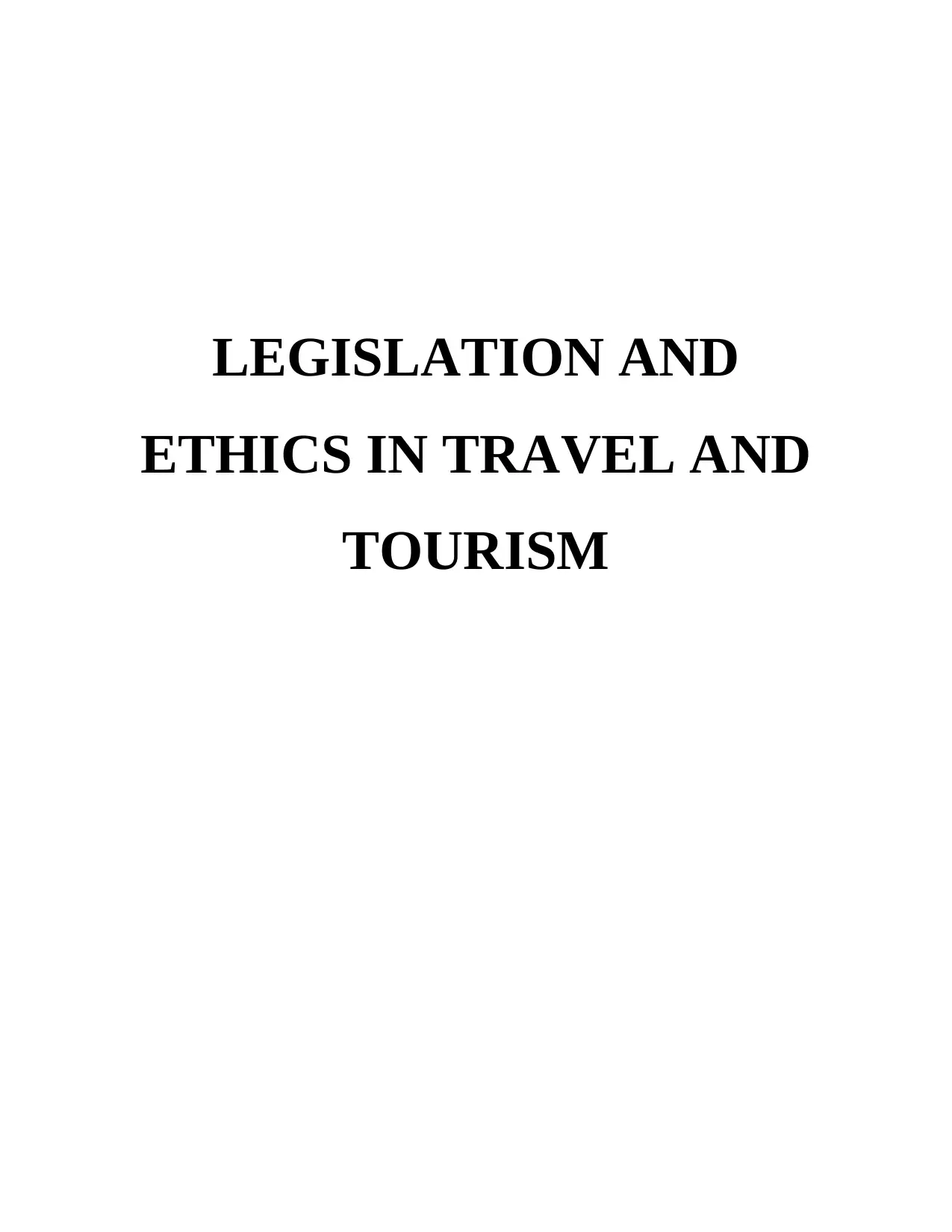
LEGISLATION AND
ETHICS IN TRAVEL AND
TOURISM
ETHICS IN TRAVEL AND
TOURISM
Paraphrase This Document
Need a fresh take? Get an instant paraphrase of this document with our AI Paraphraser
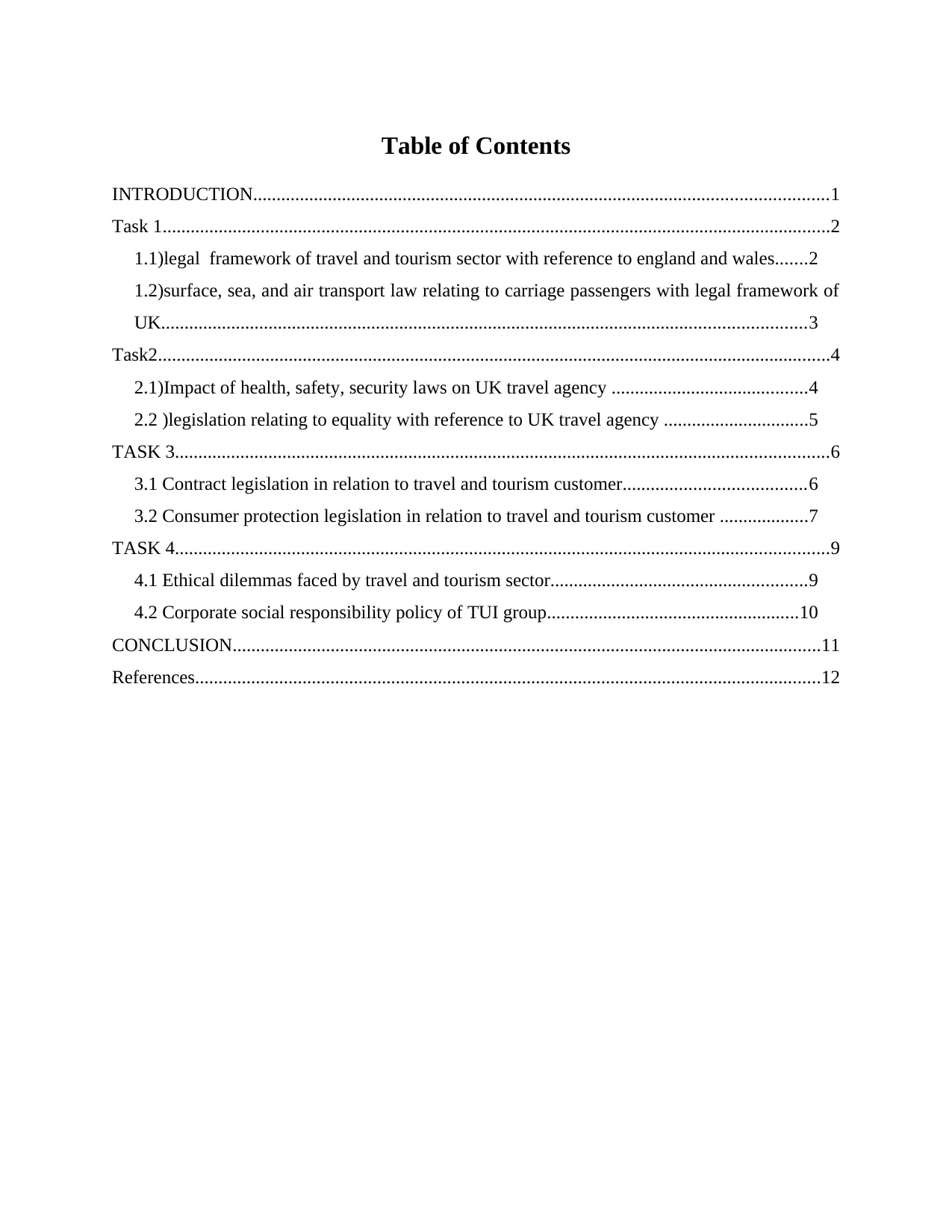
Table of Contents
INTRODUCTION...........................................................................................................................1
Task 1...............................................................................................................................................2
1.1)legal framework of travel and tourism sector with reference to england and wales.......2
1.2)surface, sea, and air transport law relating to carriage passengers with legal framework of
UK..........................................................................................................................................3
Task2................................................................................................................................................4
2.1)Impact of health, safety, security laws on UK travel agency ..........................................4
2.2 )legislation relating to equality with reference to UK travel agency ...............................5
TASK 3............................................................................................................................................6
3.1 Contract legislation in relation to travel and tourism customer.......................................6
3.2 Consumer protection legislation in relation to travel and tourism customer ...................7
TASK 4............................................................................................................................................9
4.1 Ethical dilemmas faced by travel and tourism sector.......................................................9
4.2 Corporate social responsibility policy of TUI group......................................................10
CONCLUSION..............................................................................................................................11
References......................................................................................................................................12
INTRODUCTION...........................................................................................................................1
Task 1...............................................................................................................................................2
1.1)legal framework of travel and tourism sector with reference to england and wales.......2
1.2)surface, sea, and air transport law relating to carriage passengers with legal framework of
UK..........................................................................................................................................3
Task2................................................................................................................................................4
2.1)Impact of health, safety, security laws on UK travel agency ..........................................4
2.2 )legislation relating to equality with reference to UK travel agency ...............................5
TASK 3............................................................................................................................................6
3.1 Contract legislation in relation to travel and tourism customer.......................................6
3.2 Consumer protection legislation in relation to travel and tourism customer ...................7
TASK 4............................................................................................................................................9
4.1 Ethical dilemmas faced by travel and tourism sector.......................................................9
4.2 Corporate social responsibility policy of TUI group......................................................10
CONCLUSION..............................................................................................................................11
References......................................................................................................................................12
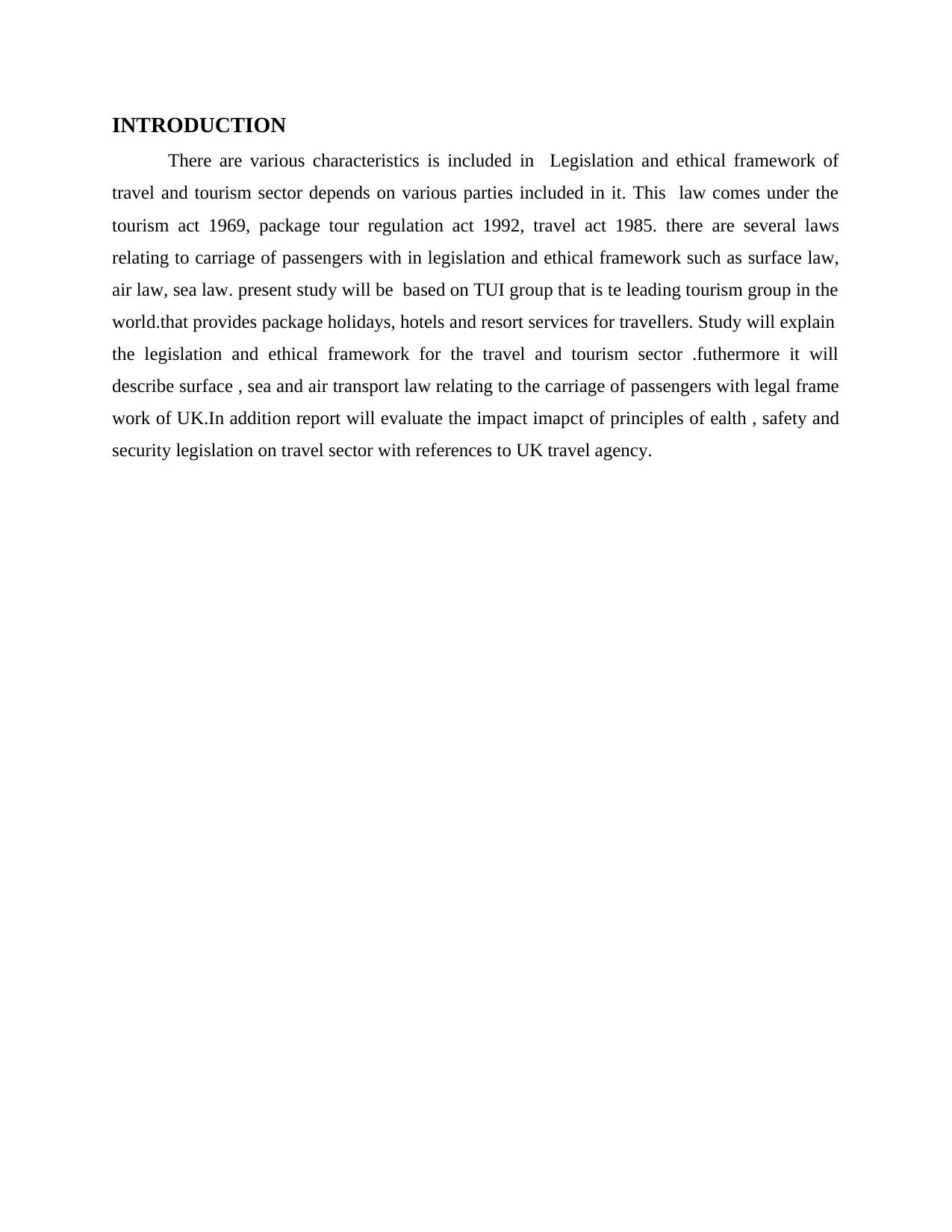
INTRODUCTION
There are various characteristics is included in Legislation and ethical framework of
travel and tourism sector depends on various parties included in it. This law comes under the
tourism act 1969, package tour regulation act 1992, travel act 1985. there are several laws
relating to carriage of passengers with in legislation and ethical framework such as surface law,
air law, sea law. present study will be based on TUI group that is te leading tourism group in the
world.that provides package holidays, hotels and resort services for travellers. Study will explain
the legislation and ethical framework for the travel and tourism sector .futhermore it will
describe surface , sea and air transport law relating to the carriage of passengers with legal frame
work of UK.In addition report will evaluate the impact imapct of principles of ealth , safety and
security legislation on travel sector with references to UK travel agency.
There are various characteristics is included in Legislation and ethical framework of
travel and tourism sector depends on various parties included in it. This law comes under the
tourism act 1969, package tour regulation act 1992, travel act 1985. there are several laws
relating to carriage of passengers with in legislation and ethical framework such as surface law,
air law, sea law. present study will be based on TUI group that is te leading tourism group in the
world.that provides package holidays, hotels and resort services for travellers. Study will explain
the legislation and ethical framework for the travel and tourism sector .futhermore it will
describe surface , sea and air transport law relating to the carriage of passengers with legal frame
work of UK.In addition report will evaluate the impact imapct of principles of ealth , safety and
security legislation on travel sector with references to UK travel agency.
⊘ This is a preview!⊘
Do you want full access?
Subscribe today to unlock all pages.

Trusted by 1+ million students worldwide
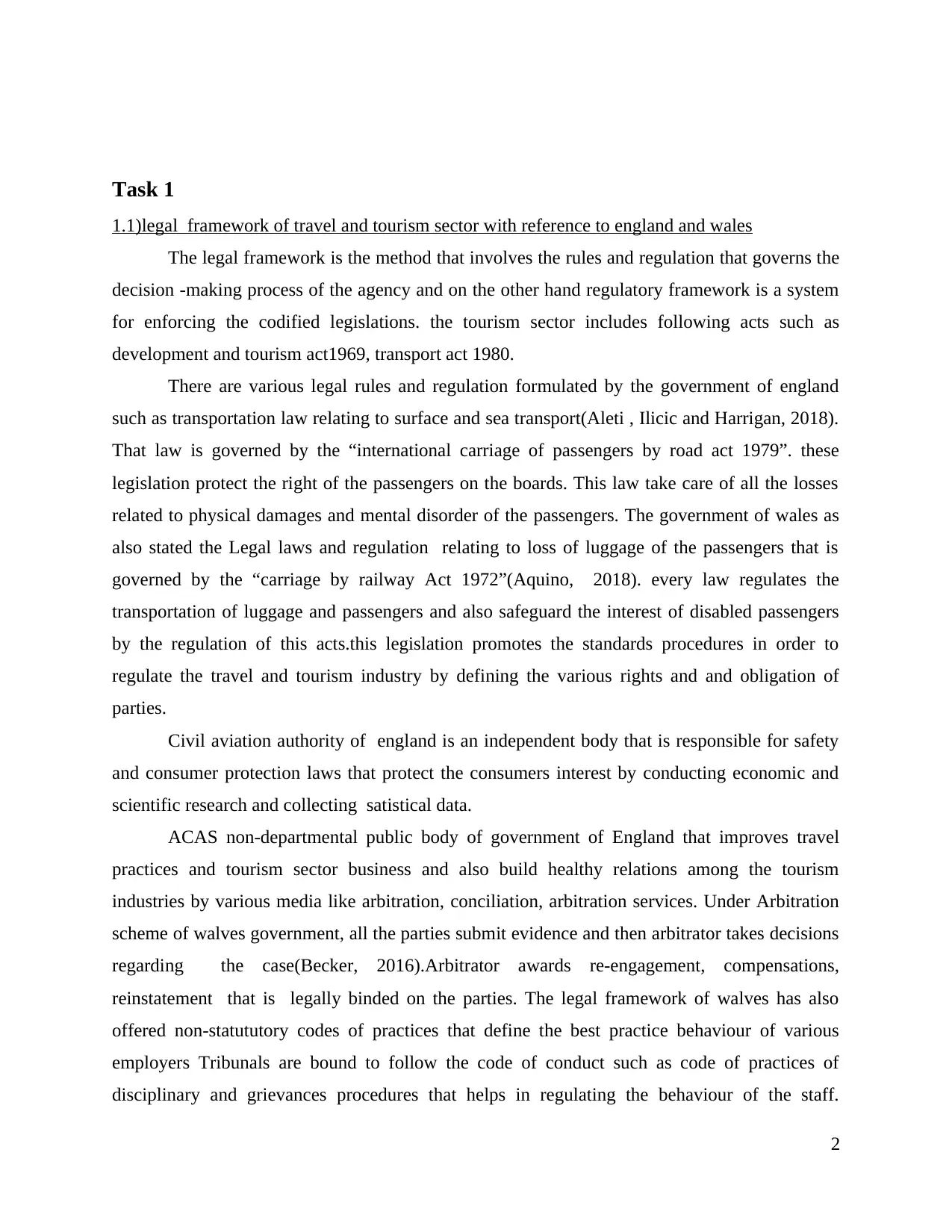
Task 1
1.1)legal framework of travel and tourism sector with reference to england and wales
The legal framework is the method that involves the rules and regulation that governs the
decision -making process of the agency and on the other hand regulatory framework is a system
for enforcing the codified legislations. the tourism sector includes following acts such as
development and tourism act1969, transport act 1980.
There are various legal rules and regulation formulated by the government of england
such as transportation law relating to surface and sea transport(Aleti , Ilicic and Harrigan, 2018).
That law is governed by the “international carriage of passengers by road act 1979”. these
legislation protect the right of the passengers on the boards. This law take care of all the losses
related to physical damages and mental disorder of the passengers. The government of wales as
also stated the Legal laws and regulation relating to loss of luggage of the passengers that is
governed by the “carriage by railway Act 1972”(Aquino, 2018). every law regulates the
transportation of luggage and passengers and also safeguard the interest of disabled passengers
by the regulation of this acts.this legislation promotes the standards procedures in order to
regulate the travel and tourism industry by defining the various rights and and obligation of
parties.
Civil aviation authority of england is an independent body that is responsible for safety
and consumer protection laws that protect the consumers interest by conducting economic and
scientific research and collecting satistical data.
ACAS non-departmental public body of government of England that improves travel
practices and tourism sector business and also build healthy relations among the tourism
industries by various media like arbitration, conciliation, arbitration services. Under Arbitration
scheme of walves government, all the parties submit evidence and then arbitrator takes decisions
regarding the case(Becker, 2016).Arbitrator awards re-engagement, compensations,
reinstatement that is legally binded on the parties. The legal framework of walves has also
offered non-statututory codes of practices that define the best practice behaviour of various
employers Tribunals are bound to follow the code of conduct such as code of practices of
disciplinary and grievances procedures that helps in regulating the behaviour of the staff.
2
1.1)legal framework of travel and tourism sector with reference to england and wales
The legal framework is the method that involves the rules and regulation that governs the
decision -making process of the agency and on the other hand regulatory framework is a system
for enforcing the codified legislations. the tourism sector includes following acts such as
development and tourism act1969, transport act 1980.
There are various legal rules and regulation formulated by the government of england
such as transportation law relating to surface and sea transport(Aleti , Ilicic and Harrigan, 2018).
That law is governed by the “international carriage of passengers by road act 1979”. these
legislation protect the right of the passengers on the boards. This law take care of all the losses
related to physical damages and mental disorder of the passengers. The government of wales as
also stated the Legal laws and regulation relating to loss of luggage of the passengers that is
governed by the “carriage by railway Act 1972”(Aquino, 2018). every law regulates the
transportation of luggage and passengers and also safeguard the interest of disabled passengers
by the regulation of this acts.this legislation promotes the standards procedures in order to
regulate the travel and tourism industry by defining the various rights and and obligation of
parties.
Civil aviation authority of england is an independent body that is responsible for safety
and consumer protection laws that protect the consumers interest by conducting economic and
scientific research and collecting satistical data.
ACAS non-departmental public body of government of England that improves travel
practices and tourism sector business and also build healthy relations among the tourism
industries by various media like arbitration, conciliation, arbitration services. Under Arbitration
scheme of walves government, all the parties submit evidence and then arbitrator takes decisions
regarding the case(Becker, 2016).Arbitrator awards re-engagement, compensations,
reinstatement that is legally binded on the parties. The legal framework of walves has also
offered non-statututory codes of practices that define the best practice behaviour of various
employers Tribunals are bound to follow the code of conduct such as code of practices of
disciplinary and grievances procedures that helps in regulating the behaviour of the staff.
2
Paraphrase This Document
Need a fresh take? Get an instant paraphrase of this document with our AI Paraphraser
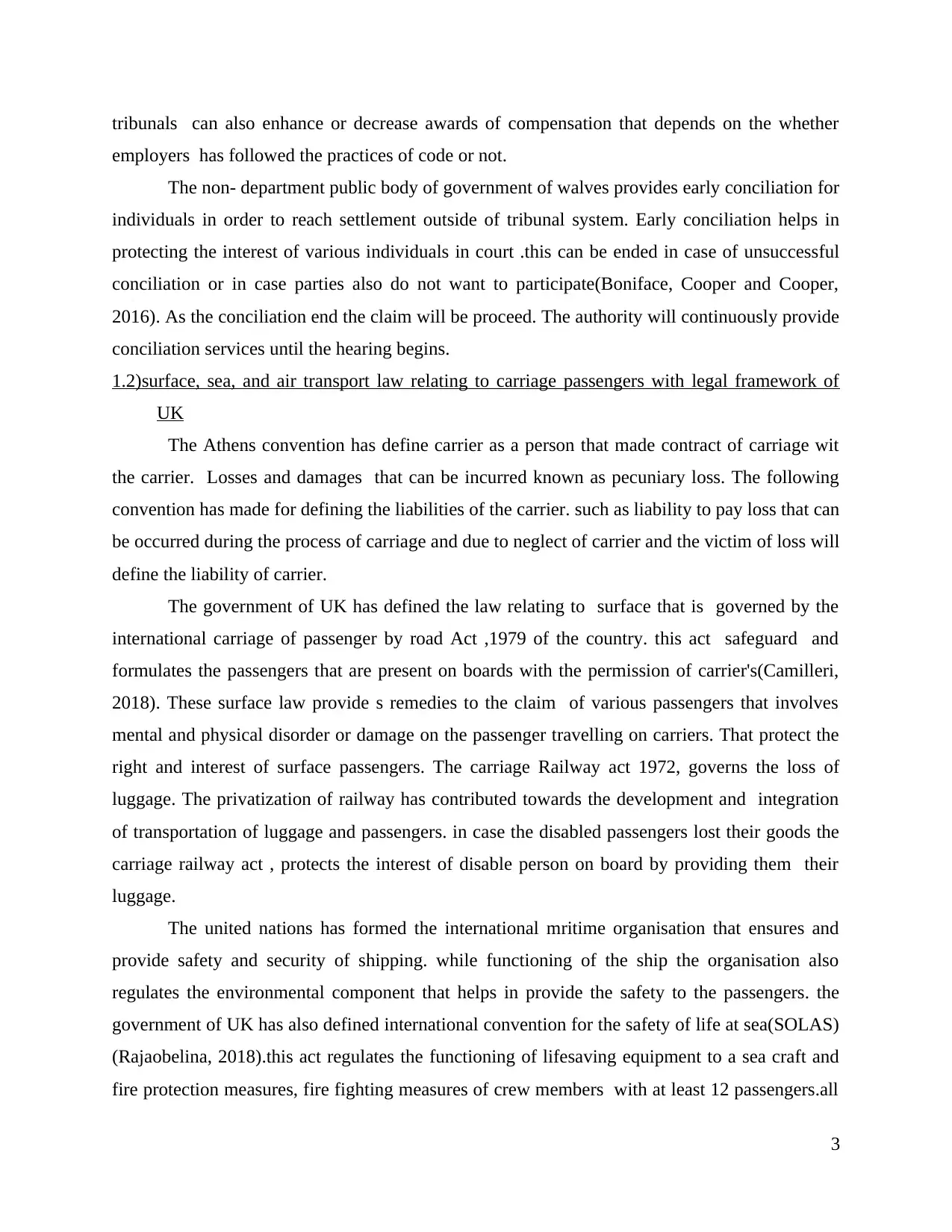
tribunals can also enhance or decrease awards of compensation that depends on the whether
employers has followed the practices of code or not.
The non- department public body of government of walves provides early conciliation for
individuals in order to reach settlement outside of tribunal system. Early conciliation helps in
protecting the interest of various individuals in court .this can be ended in case of unsuccessful
conciliation or in case parties also do not want to participate(Boniface, Cooper and Cooper,
2016). As the conciliation end the claim will be proceed. The authority will continuously provide
conciliation services until the hearing begins.
1.2)surface, sea, and air transport law relating to carriage passengers with legal framework of
UK
The Athens convention has define carrier as a person that made contract of carriage wit
the carrier. Losses and damages that can be incurred known as pecuniary loss. The following
convention has made for defining the liabilities of the carrier. such as liability to pay loss that can
be occurred during the process of carriage and due to neglect of carrier and the victim of loss will
define the liability of carrier.
The government of UK has defined the law relating to surface that is governed by the
international carriage of passenger by road Act ,1979 of the country. this act safeguard and
formulates the passengers that are present on boards with the permission of carrier's(Camilleri,
2018). These surface law provide s remedies to the claim of various passengers that involves
mental and physical disorder or damage on the passenger travelling on carriers. That protect the
right and interest of surface passengers. The carriage Railway act 1972, governs the loss of
luggage. The privatization of railway has contributed towards the development and integration
of transportation of luggage and passengers. in case the disabled passengers lost their goods the
carriage railway act , protects the interest of disable person on board by providing them their
luggage.
The united nations has formed the international mritime organisation that ensures and
provide safety and security of shipping. while functioning of the ship the organisation also
regulates the environmental component that helps in provide the safety to the passengers. the
government of UK has also defined international convention for the safety of life at sea(SOLAS)
(Rajaobelina, 2018).this act regulates the functioning of lifesaving equipment to a sea craft and
fire protection measures, fire fighting measures of crew members with at least 12 passengers.all
3
employers has followed the practices of code or not.
The non- department public body of government of walves provides early conciliation for
individuals in order to reach settlement outside of tribunal system. Early conciliation helps in
protecting the interest of various individuals in court .this can be ended in case of unsuccessful
conciliation or in case parties also do not want to participate(Boniface, Cooper and Cooper,
2016). As the conciliation end the claim will be proceed. The authority will continuously provide
conciliation services until the hearing begins.
1.2)surface, sea, and air transport law relating to carriage passengers with legal framework of
UK
The Athens convention has define carrier as a person that made contract of carriage wit
the carrier. Losses and damages that can be incurred known as pecuniary loss. The following
convention has made for defining the liabilities of the carrier. such as liability to pay loss that can
be occurred during the process of carriage and due to neglect of carrier and the victim of loss will
define the liability of carrier.
The government of UK has defined the law relating to surface that is governed by the
international carriage of passenger by road Act ,1979 of the country. this act safeguard and
formulates the passengers that are present on boards with the permission of carrier's(Camilleri,
2018). These surface law provide s remedies to the claim of various passengers that involves
mental and physical disorder or damage on the passenger travelling on carriers. That protect the
right and interest of surface passengers. The carriage Railway act 1972, governs the loss of
luggage. The privatization of railway has contributed towards the development and integration
of transportation of luggage and passengers. in case the disabled passengers lost their goods the
carriage railway act , protects the interest of disable person on board by providing them their
luggage.
The united nations has formed the international mritime organisation that ensures and
provide safety and security of shipping. while functioning of the ship the organisation also
regulates the environmental component that helps in provide the safety to the passengers. the
government of UK has also defined international convention for the safety of life at sea(SOLAS)
(Rajaobelina, 2018).this act regulates the functioning of lifesaving equipment to a sea craft and
fire protection measures, fire fighting measures of crew members with at least 12 passengers.all
3
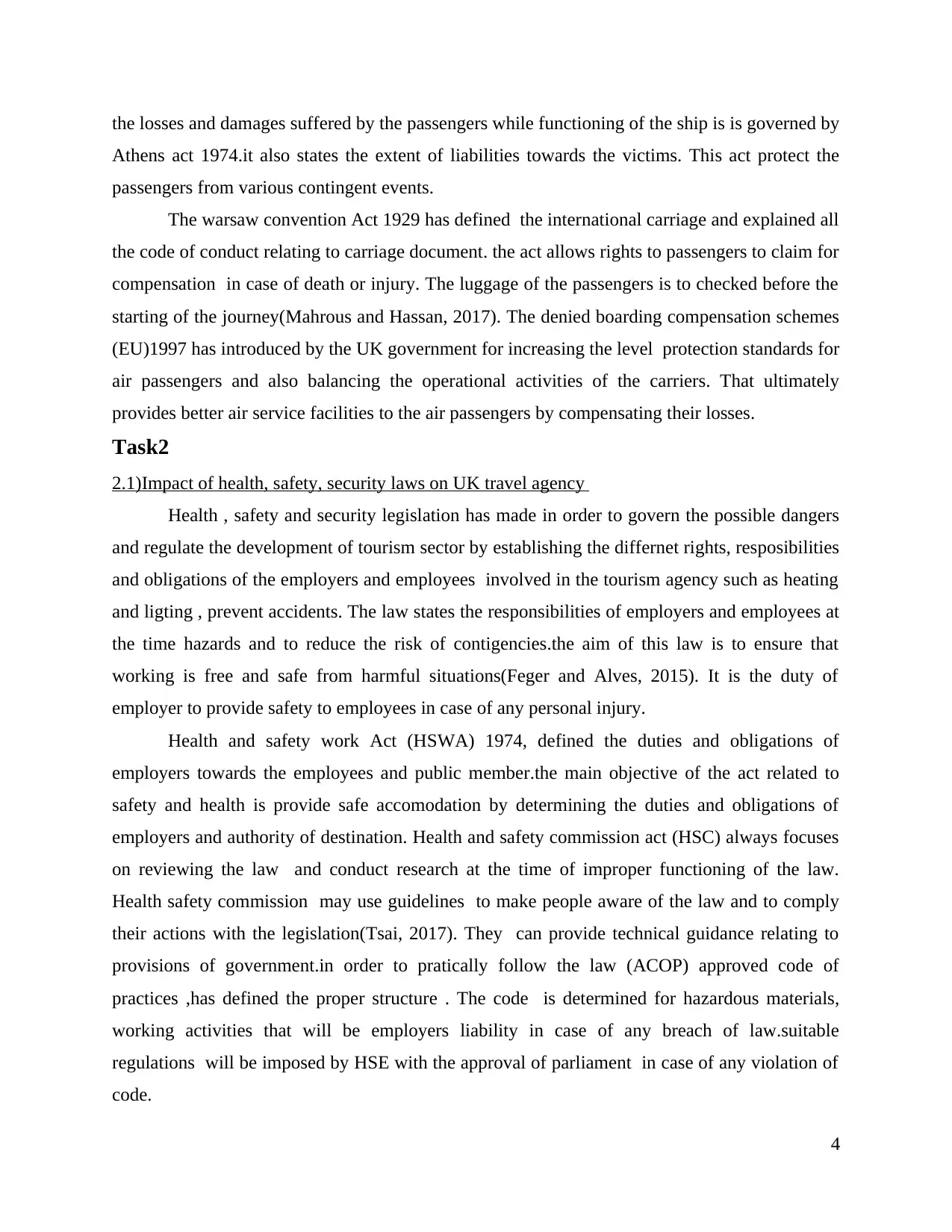
the losses and damages suffered by the passengers while functioning of the ship is is governed by
Athens act 1974.it also states the extent of liabilities towards the victims. This act protect the
passengers from various contingent events.
The warsaw convention Act 1929 has defined the international carriage and explained all
the code of conduct relating to carriage document. the act allows rights to passengers to claim for
compensation in case of death or injury. The luggage of the passengers is to checked before the
starting of the journey(Mahrous and Hassan, 2017). The denied boarding compensation schemes
(EU)1997 has introduced by the UK government for increasing the level protection standards for
air passengers and also balancing the operational activities of the carriers. That ultimately
provides better air service facilities to the air passengers by compensating their losses.
Task2
2.1)Impact of health, safety, security laws on UK travel agency
Health , safety and security legislation has made in order to govern the possible dangers
and regulate the development of tourism sector by establishing the differnet rights, resposibilities
and obligations of the employers and employees involved in the tourism agency such as heating
and ligting , prevent accidents. The law states the responsibilities of employers and employees at
the time hazards and to reduce the risk of contigencies.the aim of this law is to ensure that
working is free and safe from harmful situations(Feger and Alves, 2015). It is the duty of
employer to provide safety to employees in case of any personal injury.
Health and safety work Act (HSWA) 1974, defined the duties and obligations of
employers towards the employees and public member.the main objective of the act related to
safety and health is provide safe accomodation by determining the duties and obligations of
employers and authority of destination. Health and safety commission act (HSC) always focuses
on reviewing the law and conduct research at the time of improper functioning of the law.
Health safety commission may use guidelines to make people aware of the law and to comply
their actions with the legislation(Tsai, 2017). They can provide technical guidance relating to
provisions of government.in order to pratically follow the law (ACOP) approved code of
practices ,has defined the proper structure . The code is determined for hazardous materials,
working activities that will be employers liability in case of any breach of law.suitable
regulations will be imposed by HSE with the approval of parliament in case of any violation of
code.
4
Athens act 1974.it also states the extent of liabilities towards the victims. This act protect the
passengers from various contingent events.
The warsaw convention Act 1929 has defined the international carriage and explained all
the code of conduct relating to carriage document. the act allows rights to passengers to claim for
compensation in case of death or injury. The luggage of the passengers is to checked before the
starting of the journey(Mahrous and Hassan, 2017). The denied boarding compensation schemes
(EU)1997 has introduced by the UK government for increasing the level protection standards for
air passengers and also balancing the operational activities of the carriers. That ultimately
provides better air service facilities to the air passengers by compensating their losses.
Task2
2.1)Impact of health, safety, security laws on UK travel agency
Health , safety and security legislation has made in order to govern the possible dangers
and regulate the development of tourism sector by establishing the differnet rights, resposibilities
and obligations of the employers and employees involved in the tourism agency such as heating
and ligting , prevent accidents. The law states the responsibilities of employers and employees at
the time hazards and to reduce the risk of contigencies.the aim of this law is to ensure that
working is free and safe from harmful situations(Feger and Alves, 2015). It is the duty of
employer to provide safety to employees in case of any personal injury.
Health and safety work Act (HSWA) 1974, defined the duties and obligations of
employers towards the employees and public member.the main objective of the act related to
safety and health is provide safe accomodation by determining the duties and obligations of
employers and authority of destination. Health and safety commission act (HSC) always focuses
on reviewing the law and conduct research at the time of improper functioning of the law.
Health safety commission may use guidelines to make people aware of the law and to comply
their actions with the legislation(Tsai, 2017). They can provide technical guidance relating to
provisions of government.in order to pratically follow the law (ACOP) approved code of
practices ,has defined the proper structure . The code is determined for hazardous materials,
working activities that will be employers liability in case of any breach of law.suitable
regulations will be imposed by HSE with the approval of parliament in case of any violation of
code.
4
⊘ This is a preview!⊘
Do you want full access?
Subscribe today to unlock all pages.

Trusted by 1+ million students worldwide
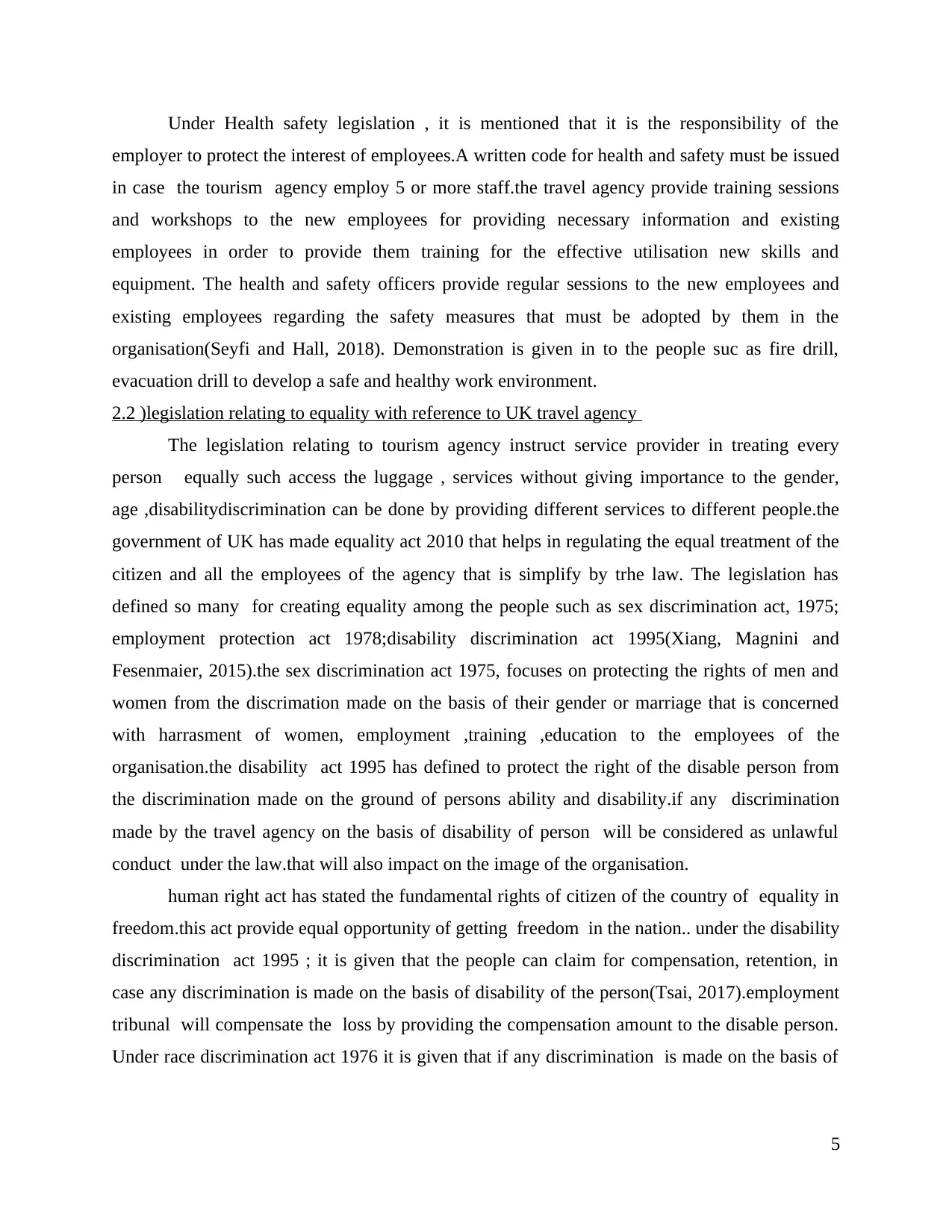
Under Health safety legislation , it is mentioned that it is the responsibility of the
employer to protect the interest of employees.A written code for health and safety must be issued
in case the tourism agency employ 5 or more staff.the travel agency provide training sessions
and workshops to the new employees for providing necessary information and existing
employees in order to provide them training for the effective utilisation new skills and
equipment. The health and safety officers provide regular sessions to the new employees and
existing employees regarding the safety measures that must be adopted by them in the
organisation(Seyfi and Hall, 2018). Demonstration is given in to the people suc as fire drill,
evacuation drill to develop a safe and healthy work environment.
2.2 )legislation relating to equality with reference to UK travel agency
The legislation relating to tourism agency instruct service provider in treating every
person equally such access the luggage , services without giving importance to the gender,
age ,disabilitydiscrimination can be done by providing different services to different people.the
government of UK has made equality act 2010 that helps in regulating the equal treatment of the
citizen and all the employees of the agency that is simplify by trhe law. The legislation has
defined so many for creating equality among the people such as sex discrimination act, 1975;
employment protection act 1978;disability discrimination act 1995(Xiang, Magnini and
Fesenmaier, 2015).the sex discrimination act 1975, focuses on protecting the rights of men and
women from the discrimation made on the basis of their gender or marriage that is concerned
with harrasment of women, employment ,training ,education to the employees of the
organisation.the disability act 1995 has defined to protect the right of the disable person from
the discrimination made on the ground of persons ability and disability.if any discrimination
made by the travel agency on the basis of disability of person will be considered as unlawful
conduct under the law.that will also impact on the image of the organisation.
human right act has stated the fundamental rights of citizen of the country of equality in
freedom.this act provide equal opportunity of getting freedom in the nation.. under the disability
discrimination act 1995 ; it is given that the people can claim for compensation, retention, in
case any discrimination is made on the basis of disability of the person(Tsai, 2017).employment
tribunal will compensate the loss by providing the compensation amount to the disable person.
Under race discrimination act 1976 it is given that if any discrimination is made on the basis of
5
employer to protect the interest of employees.A written code for health and safety must be issued
in case the tourism agency employ 5 or more staff.the travel agency provide training sessions
and workshops to the new employees for providing necessary information and existing
employees in order to provide them training for the effective utilisation new skills and
equipment. The health and safety officers provide regular sessions to the new employees and
existing employees regarding the safety measures that must be adopted by them in the
organisation(Seyfi and Hall, 2018). Demonstration is given in to the people suc as fire drill,
evacuation drill to develop a safe and healthy work environment.
2.2 )legislation relating to equality with reference to UK travel agency
The legislation relating to tourism agency instruct service provider in treating every
person equally such access the luggage , services without giving importance to the gender,
age ,disabilitydiscrimination can be done by providing different services to different people.the
government of UK has made equality act 2010 that helps in regulating the equal treatment of the
citizen and all the employees of the agency that is simplify by trhe law. The legislation has
defined so many for creating equality among the people such as sex discrimination act, 1975;
employment protection act 1978;disability discrimination act 1995(Xiang, Magnini and
Fesenmaier, 2015).the sex discrimination act 1975, focuses on protecting the rights of men and
women from the discrimation made on the basis of their gender or marriage that is concerned
with harrasment of women, employment ,training ,education to the employees of the
organisation.the disability act 1995 has defined to protect the right of the disable person from
the discrimination made on the ground of persons ability and disability.if any discrimination
made by the travel agency on the basis of disability of person will be considered as unlawful
conduct under the law.that will also impact on the image of the organisation.
human right act has stated the fundamental rights of citizen of the country of equality in
freedom.this act provide equal opportunity of getting freedom in the nation.. under the disability
discrimination act 1995 ; it is given that the people can claim for compensation, retention, in
case any discrimination is made on the basis of disability of the person(Tsai, 2017).employment
tribunal will compensate the loss by providing the compensation amount to the disable person.
Under race discrimination act 1976 it is given that if any discrimination is made on the basis of
5
Paraphrase This Document
Need a fresh take? Get an instant paraphrase of this document with our AI Paraphraser
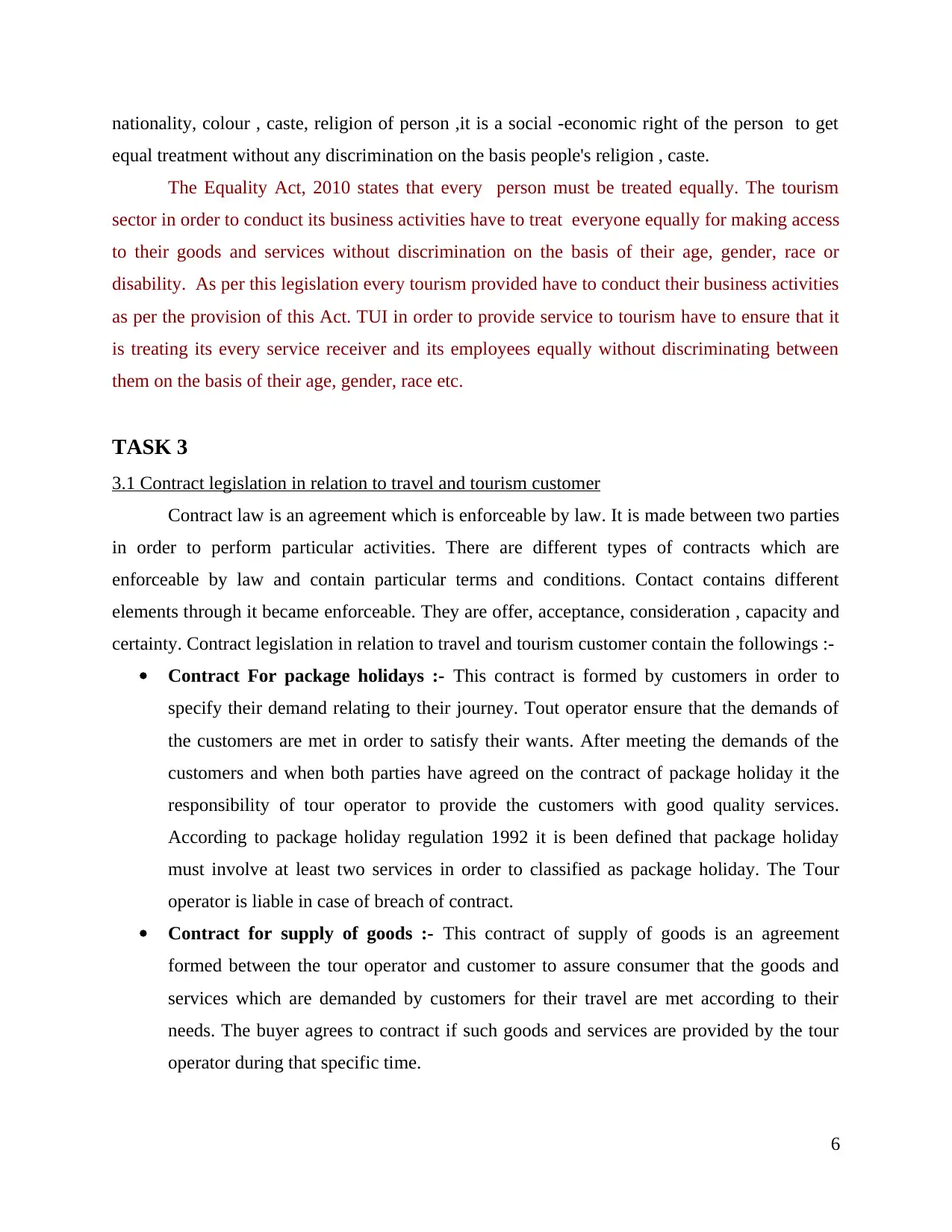
nationality, colour , caste, religion of person ,it is a social -economic right of the person to get
equal treatment without any discrimination on the basis people's religion , caste.
The Equality Act, 2010 states that every person must be treated equally. The tourism
sector in order to conduct its business activities have to treat everyone equally for making access
to their goods and services without discrimination on the basis of their age, gender, race or
disability. As per this legislation every tourism provided have to conduct their business activities
as per the provision of this Act. TUI in order to provide service to tourism have to ensure that it
is treating its every service receiver and its employees equally without discriminating between
them on the basis of their age, gender, race etc.
TASK 3
3.1 Contract legislation in relation to travel and tourism customer
Contract law is an agreement which is enforceable by law. It is made between two parties
in order to perform particular activities. There are different types of contracts which are
enforceable by law and contain particular terms and conditions. Contact contains different
elements through it became enforceable. They are offer, acceptance, consideration , capacity and
certainty. Contract legislation in relation to travel and tourism customer contain the followings :-
Contract For package holidays :- This contract is formed by customers in order to
specify their demand relating to their journey. Tout operator ensure that the demands of
the customers are met in order to satisfy their wants. After meeting the demands of the
customers and when both parties have agreed on the contract of package holiday it the
responsibility of tour operator to provide the customers with good quality services.
According to package holiday regulation 1992 it is been defined that package holiday
must involve at least two services in order to classified as package holiday. The Tour
operator is liable in case of breach of contract.
Contract for supply of goods :- This contract of supply of goods is an agreement
formed between the tour operator and customer to assure consumer that the goods and
services which are demanded by customers for their travel are met according to their
needs. The buyer agrees to contract if such goods and services are provided by the tour
operator during that specific time.
6
equal treatment without any discrimination on the basis people's religion , caste.
The Equality Act, 2010 states that every person must be treated equally. The tourism
sector in order to conduct its business activities have to treat everyone equally for making access
to their goods and services without discrimination on the basis of their age, gender, race or
disability. As per this legislation every tourism provided have to conduct their business activities
as per the provision of this Act. TUI in order to provide service to tourism have to ensure that it
is treating its every service receiver and its employees equally without discriminating between
them on the basis of their age, gender, race etc.
TASK 3
3.1 Contract legislation in relation to travel and tourism customer
Contract law is an agreement which is enforceable by law. It is made between two parties
in order to perform particular activities. There are different types of contracts which are
enforceable by law and contain particular terms and conditions. Contact contains different
elements through it became enforceable. They are offer, acceptance, consideration , capacity and
certainty. Contract legislation in relation to travel and tourism customer contain the followings :-
Contract For package holidays :- This contract is formed by customers in order to
specify their demand relating to their journey. Tout operator ensure that the demands of
the customers are met in order to satisfy their wants. After meeting the demands of the
customers and when both parties have agreed on the contract of package holiday it the
responsibility of tour operator to provide the customers with good quality services.
According to package holiday regulation 1992 it is been defined that package holiday
must involve at least two services in order to classified as package holiday. The Tour
operator is liable in case of breach of contract.
Contract for supply of goods :- This contract of supply of goods is an agreement
formed between the tour operator and customer to assure consumer that the goods and
services which are demanded by customers for their travel are met according to their
needs. The buyer agrees to contract if such goods and services are provided by the tour
operator during that specific time.
6
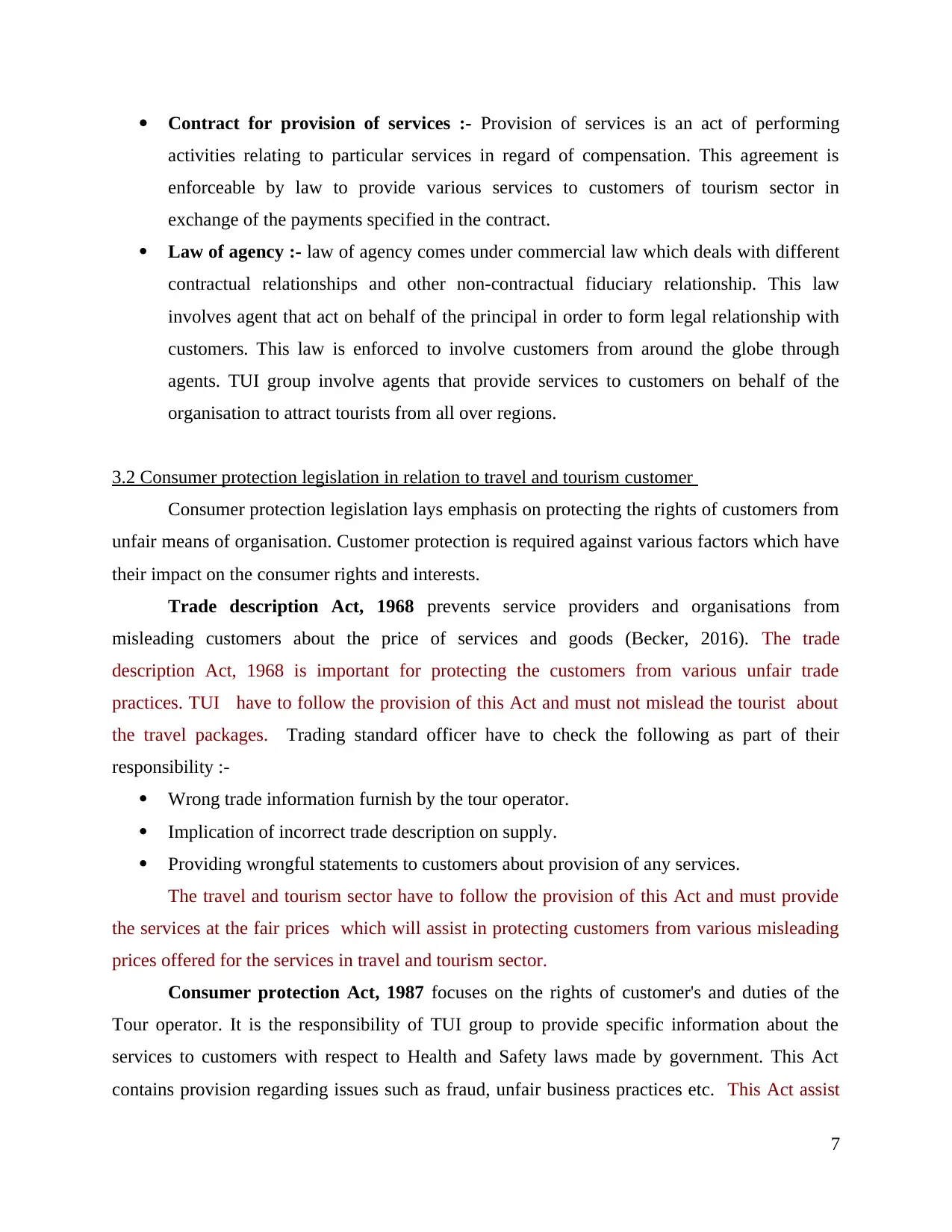
Contract for provision of services :- Provision of services is an act of performing
activities relating to particular services in regard of compensation. This agreement is
enforceable by law to provide various services to customers of tourism sector in
exchange of the payments specified in the contract.
Law of agency :- law of agency comes under commercial law which deals with different
contractual relationships and other non-contractual fiduciary relationship. This law
involves agent that act on behalf of the principal in order to form legal relationship with
customers. This law is enforced to involve customers from around the globe through
agents. TUI group involve agents that provide services to customers on behalf of the
organisation to attract tourists from all over regions.
3.2 Consumer protection legislation in relation to travel and tourism customer
Consumer protection legislation lays emphasis on protecting the rights of customers from
unfair means of organisation. Customer protection is required against various factors which have
their impact on the consumer rights and interests.
Trade description Act, 1968 prevents service providers and organisations from
misleading customers about the price of services and goods (Becker, 2016). The trade
description Act, 1968 is important for protecting the customers from various unfair trade
practices. TUI have to follow the provision of this Act and must not mislead the tourist about
the travel packages. Trading standard officer have to check the following as part of their
responsibility :-
Wrong trade information furnish by the tour operator.
Implication of incorrect trade description on supply.
Providing wrongful statements to customers about provision of any services.
The travel and tourism sector have to follow the provision of this Act and must provide
the services at the fair prices which will assist in protecting customers from various misleading
prices offered for the services in travel and tourism sector.
Consumer protection Act, 1987 focuses on the rights of customer's and duties of the
Tour operator. It is the responsibility of TUI group to provide specific information about the
services to customers with respect to Health and Safety laws made by government. This Act
contains provision regarding issues such as fraud, unfair business practices etc. This Act assist
7
activities relating to particular services in regard of compensation. This agreement is
enforceable by law to provide various services to customers of tourism sector in
exchange of the payments specified in the contract.
Law of agency :- law of agency comes under commercial law which deals with different
contractual relationships and other non-contractual fiduciary relationship. This law
involves agent that act on behalf of the principal in order to form legal relationship with
customers. This law is enforced to involve customers from around the globe through
agents. TUI group involve agents that provide services to customers on behalf of the
organisation to attract tourists from all over regions.
3.2 Consumer protection legislation in relation to travel and tourism customer
Consumer protection legislation lays emphasis on protecting the rights of customers from
unfair means of organisation. Customer protection is required against various factors which have
their impact on the consumer rights and interests.
Trade description Act, 1968 prevents service providers and organisations from
misleading customers about the price of services and goods (Becker, 2016). The trade
description Act, 1968 is important for protecting the customers from various unfair trade
practices. TUI have to follow the provision of this Act and must not mislead the tourist about
the travel packages. Trading standard officer have to check the following as part of their
responsibility :-
Wrong trade information furnish by the tour operator.
Implication of incorrect trade description on supply.
Providing wrongful statements to customers about provision of any services.
The travel and tourism sector have to follow the provision of this Act and must provide
the services at the fair prices which will assist in protecting customers from various misleading
prices offered for the services in travel and tourism sector.
Consumer protection Act, 1987 focuses on the rights of customer's and duties of the
Tour operator. It is the responsibility of TUI group to provide specific information about the
services to customers with respect to Health and Safety laws made by government. This Act
contains provision regarding issues such as fraud, unfair business practices etc. This Act assist
7
⊘ This is a preview!⊘
Do you want full access?
Subscribe today to unlock all pages.

Trusted by 1+ million students worldwide
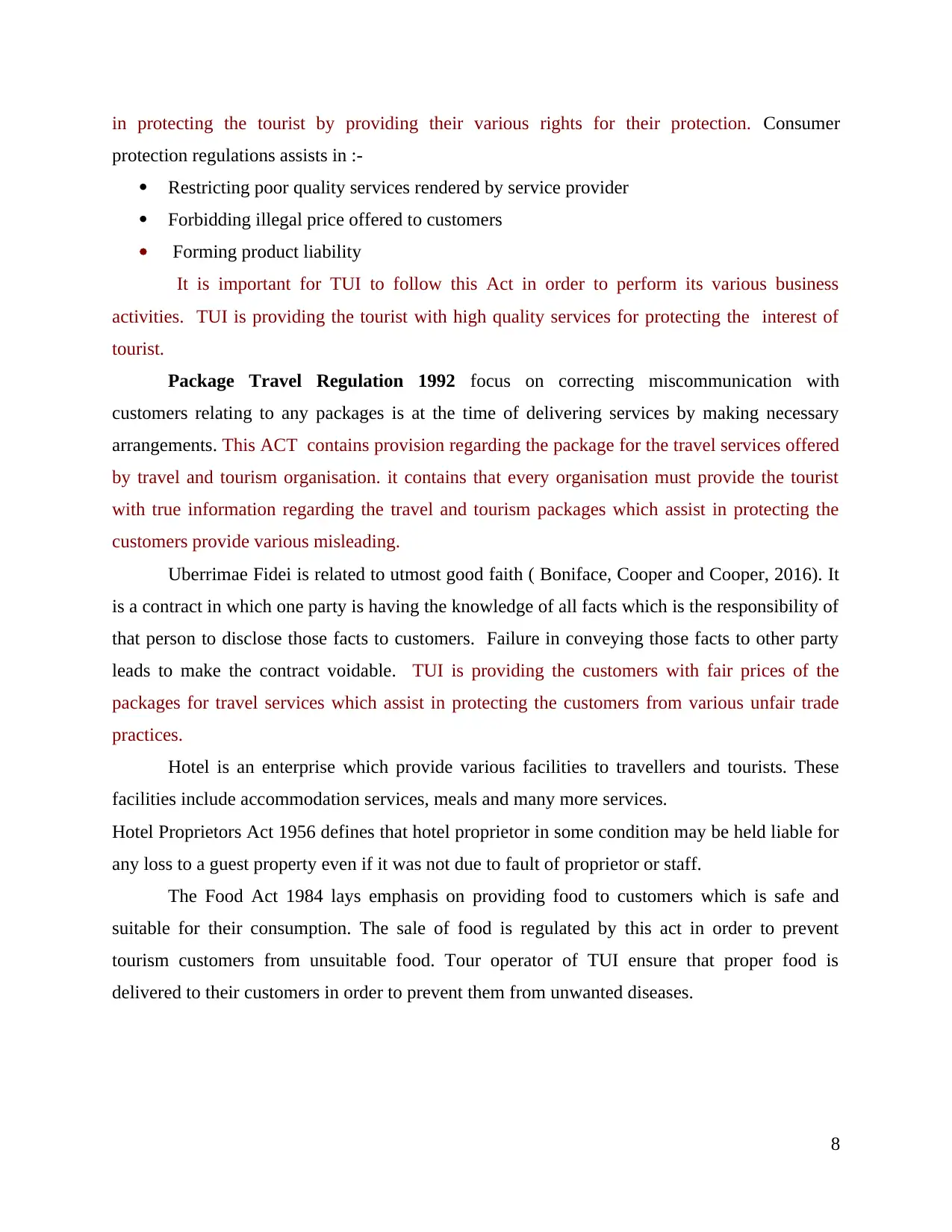
in protecting the tourist by providing their various rights for their protection. Consumer
protection regulations assists in :-
Restricting poor quality services rendered by service provider
Forbidding illegal price offered to customers
Forming product liability
It is important for TUI to follow this Act in order to perform its various business
activities. TUI is providing the tourist with high quality services for protecting the interest of
tourist.
Package Travel Regulation 1992 focus on correcting miscommunication with
customers relating to any packages is at the time of delivering services by making necessary
arrangements. This ACT contains provision regarding the package for the travel services offered
by travel and tourism organisation. it contains that every organisation must provide the tourist
with true information regarding the travel and tourism packages which assist in protecting the
customers provide various misleading.
Uberrimae Fidei is related to utmost good faith ( Boniface, Cooper and Cooper, 2016). It
is a contract in which one party is having the knowledge of all facts which is the responsibility of
that person to disclose those facts to customers. Failure in conveying those facts to other party
leads to make the contract voidable. TUI is providing the customers with fair prices of the
packages for travel services which assist in protecting the customers from various unfair trade
practices.
Hotel is an enterprise which provide various facilities to travellers and tourists. These
facilities include accommodation services, meals and many more services.
Hotel Proprietors Act 1956 defines that hotel proprietor in some condition may be held liable for
any loss to a guest property even if it was not due to fault of proprietor or staff.
The Food Act 1984 lays emphasis on providing food to customers which is safe and
suitable for their consumption. The sale of food is regulated by this act in order to prevent
tourism customers from unsuitable food. Tour operator of TUI ensure that proper food is
delivered to their customers in order to prevent them from unwanted diseases.
8
protection regulations assists in :-
Restricting poor quality services rendered by service provider
Forbidding illegal price offered to customers
Forming product liability
It is important for TUI to follow this Act in order to perform its various business
activities. TUI is providing the tourist with high quality services for protecting the interest of
tourist.
Package Travel Regulation 1992 focus on correcting miscommunication with
customers relating to any packages is at the time of delivering services by making necessary
arrangements. This ACT contains provision regarding the package for the travel services offered
by travel and tourism organisation. it contains that every organisation must provide the tourist
with true information regarding the travel and tourism packages which assist in protecting the
customers provide various misleading.
Uberrimae Fidei is related to utmost good faith ( Boniface, Cooper and Cooper, 2016). It
is a contract in which one party is having the knowledge of all facts which is the responsibility of
that person to disclose those facts to customers. Failure in conveying those facts to other party
leads to make the contract voidable. TUI is providing the customers with fair prices of the
packages for travel services which assist in protecting the customers from various unfair trade
practices.
Hotel is an enterprise which provide various facilities to travellers and tourists. These
facilities include accommodation services, meals and many more services.
Hotel Proprietors Act 1956 defines that hotel proprietor in some condition may be held liable for
any loss to a guest property even if it was not due to fault of proprietor or staff.
The Food Act 1984 lays emphasis on providing food to customers which is safe and
suitable for their consumption. The sale of food is regulated by this act in order to prevent
tourism customers from unsuitable food. Tour operator of TUI ensure that proper food is
delivered to their customers in order to prevent them from unwanted diseases.
8
Paraphrase This Document
Need a fresh take? Get an instant paraphrase of this document with our AI Paraphraser
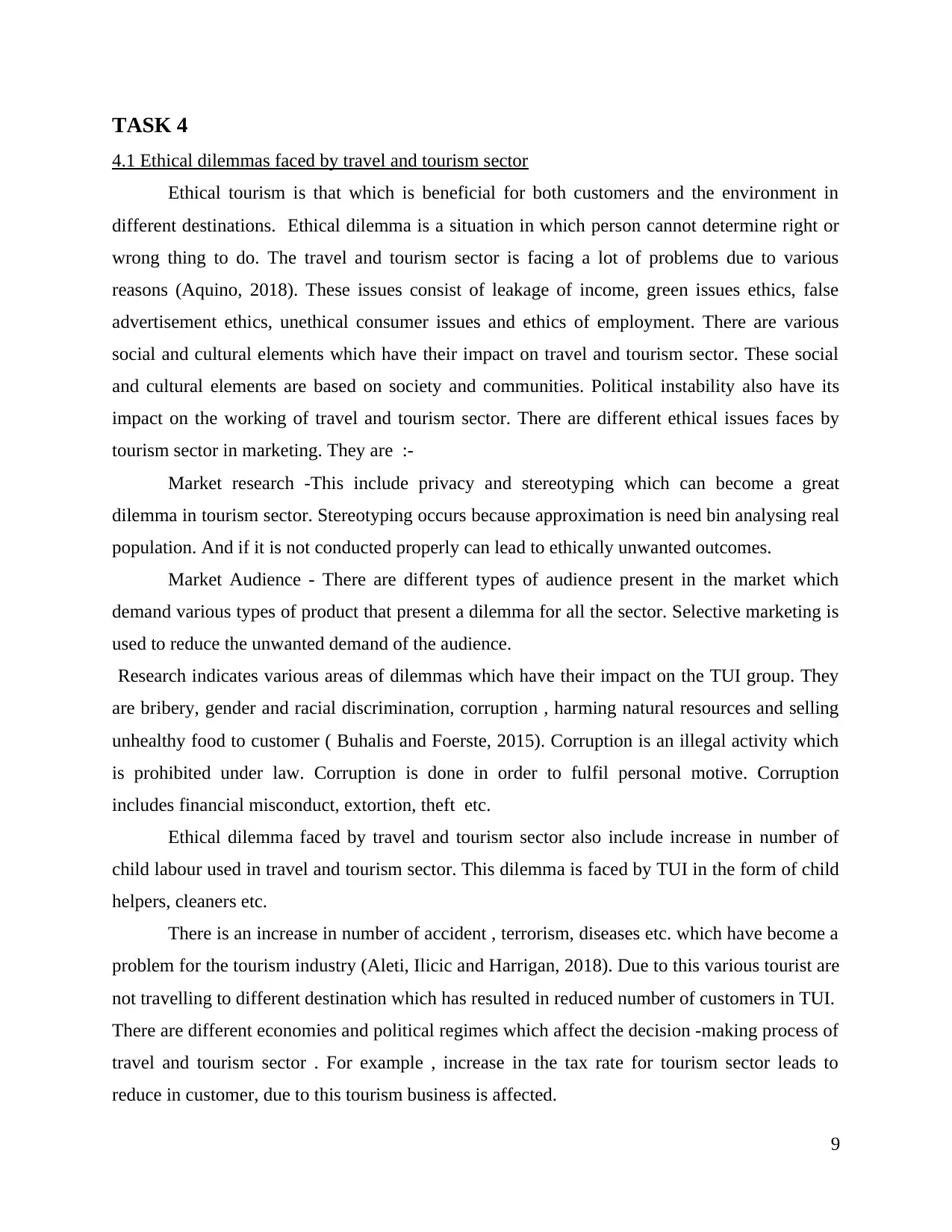
TASK 4
4.1 Ethical dilemmas faced by travel and tourism sector
Ethical tourism is that which is beneficial for both customers and the environment in
different destinations. Ethical dilemma is a situation in which person cannot determine right or
wrong thing to do. The travel and tourism sector is facing a lot of problems due to various
reasons (Aquino, 2018). These issues consist of leakage of income, green issues ethics, false
advertisement ethics, unethical consumer issues and ethics of employment. There are various
social and cultural elements which have their impact on travel and tourism sector. These social
and cultural elements are based on society and communities. Political instability also have its
impact on the working of travel and tourism sector. There are different ethical issues faces by
tourism sector in marketing. They are :-
Market research -This include privacy and stereotyping which can become a great
dilemma in tourism sector. Stereotyping occurs because approximation is need bin analysing real
population. And if it is not conducted properly can lead to ethically unwanted outcomes.
Market Audience - There are different types of audience present in the market which
demand various types of product that present a dilemma for all the sector. Selective marketing is
used to reduce the unwanted demand of the audience.
Research indicates various areas of dilemmas which have their impact on the TUI group. They
are bribery, gender and racial discrimination, corruption , harming natural resources and selling
unhealthy food to customer ( Buhalis and Foerste, 2015). Corruption is an illegal activity which
is prohibited under law. Corruption is done in order to fulfil personal motive. Corruption
includes financial misconduct, extortion, theft etc.
Ethical dilemma faced by travel and tourism sector also include increase in number of
child labour used in travel and tourism sector. This dilemma is faced by TUI in the form of child
helpers, cleaners etc.
There is an increase in number of accident , terrorism, diseases etc. which have become a
problem for the tourism industry (Aleti, Ilicic and Harrigan, 2018). Due to this various tourist are
not travelling to different destination which has resulted in reduced number of customers in TUI.
There are different economies and political regimes which affect the decision -making process of
travel and tourism sector . For example , increase in the tax rate for tourism sector leads to
reduce in customer, due to this tourism business is affected.
9
4.1 Ethical dilemmas faced by travel and tourism sector
Ethical tourism is that which is beneficial for both customers and the environment in
different destinations. Ethical dilemma is a situation in which person cannot determine right or
wrong thing to do. The travel and tourism sector is facing a lot of problems due to various
reasons (Aquino, 2018). These issues consist of leakage of income, green issues ethics, false
advertisement ethics, unethical consumer issues and ethics of employment. There are various
social and cultural elements which have their impact on travel and tourism sector. These social
and cultural elements are based on society and communities. Political instability also have its
impact on the working of travel and tourism sector. There are different ethical issues faces by
tourism sector in marketing. They are :-
Market research -This include privacy and stereotyping which can become a great
dilemma in tourism sector. Stereotyping occurs because approximation is need bin analysing real
population. And if it is not conducted properly can lead to ethically unwanted outcomes.
Market Audience - There are different types of audience present in the market which
demand various types of product that present a dilemma for all the sector. Selective marketing is
used to reduce the unwanted demand of the audience.
Research indicates various areas of dilemmas which have their impact on the TUI group. They
are bribery, gender and racial discrimination, corruption , harming natural resources and selling
unhealthy food to customer ( Buhalis and Foerste, 2015). Corruption is an illegal activity which
is prohibited under law. Corruption is done in order to fulfil personal motive. Corruption
includes financial misconduct, extortion, theft etc.
Ethical dilemma faced by travel and tourism sector also include increase in number of
child labour used in travel and tourism sector. This dilemma is faced by TUI in the form of child
helpers, cleaners etc.
There is an increase in number of accident , terrorism, diseases etc. which have become a
problem for the tourism industry (Aleti, Ilicic and Harrigan, 2018). Due to this various tourist are
not travelling to different destination which has resulted in reduced number of customers in TUI.
There are different economies and political regimes which affect the decision -making process of
travel and tourism sector . For example , increase in the tax rate for tourism sector leads to
reduce in customer, due to this tourism business is affected.
9
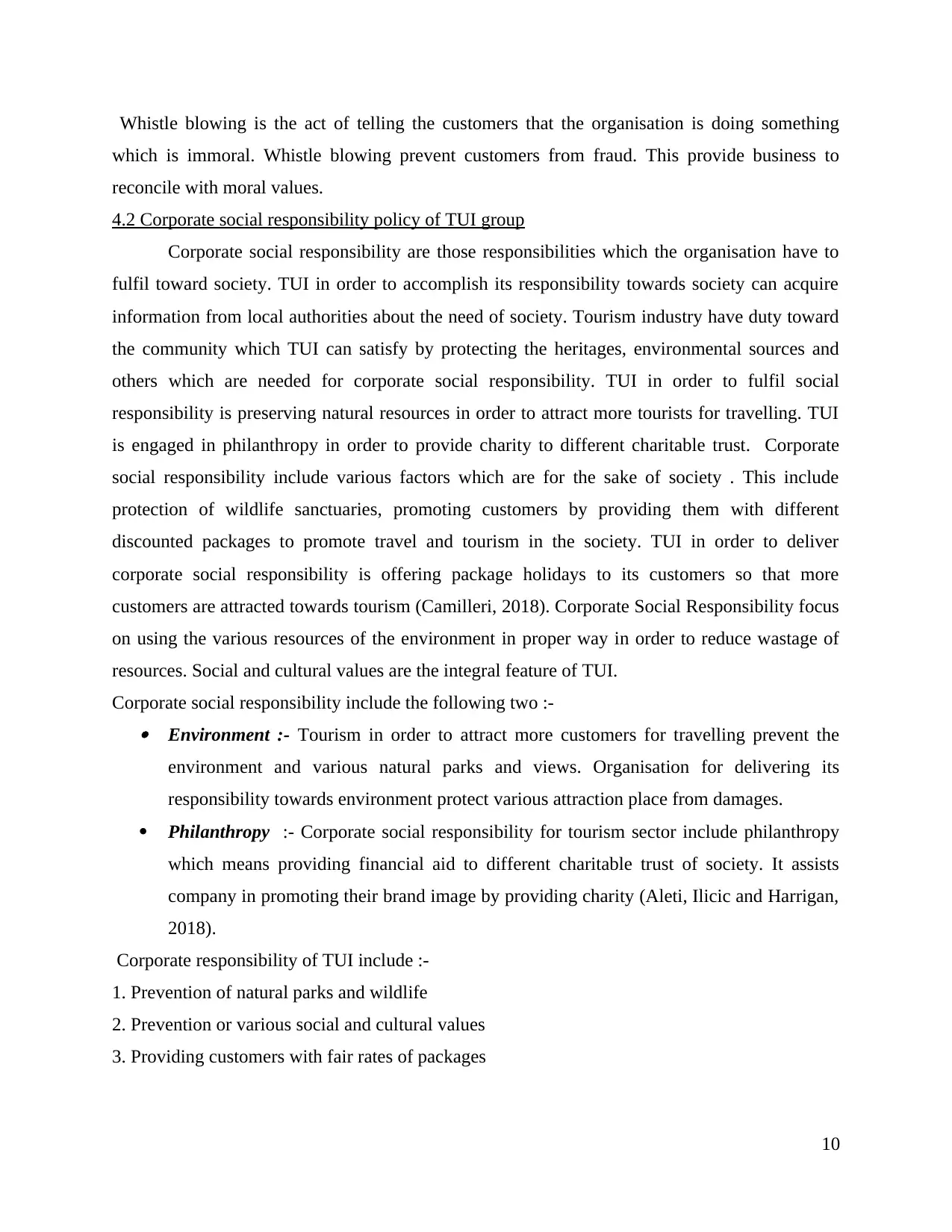
Whistle blowing is the act of telling the customers that the organisation is doing something
which is immoral. Whistle blowing prevent customers from fraud. This provide business to
reconcile with moral values.
4.2 Corporate social responsibility policy of TUI group
Corporate social responsibility are those responsibilities which the organisation have to
fulfil toward society. TUI in order to accomplish its responsibility towards society can acquire
information from local authorities about the need of society. Tourism industry have duty toward
the community which TUI can satisfy by protecting the heritages, environmental sources and
others which are needed for corporate social responsibility. TUI in order to fulfil social
responsibility is preserving natural resources in order to attract more tourists for travelling. TUI
is engaged in philanthropy in order to provide charity to different charitable trust. Corporate
social responsibility include various factors which are for the sake of society . This include
protection of wildlife sanctuaries, promoting customers by providing them with different
discounted packages to promote travel and tourism in the society. TUI in order to deliver
corporate social responsibility is offering package holidays to its customers so that more
customers are attracted towards tourism (Camilleri, 2018). Corporate Social Responsibility focus
on using the various resources of the environment in proper way in order to reduce wastage of
resources. Social and cultural values are the integral feature of TUI.
Corporate social responsibility include the following two :- Environment :- Tourism in order to attract more customers for travelling prevent the
environment and various natural parks and views. Organisation for delivering its
responsibility towards environment protect various attraction place from damages.
Philanthropy :- Corporate social responsibility for tourism sector include philanthropy
which means providing financial aid to different charitable trust of society. It assists
company in promoting their brand image by providing charity (Aleti, Ilicic and Harrigan,
2018).
Corporate responsibility of TUI include :-
1. Prevention of natural parks and wildlife
2. Prevention or various social and cultural values
3. Providing customers with fair rates of packages
10
which is immoral. Whistle blowing prevent customers from fraud. This provide business to
reconcile with moral values.
4.2 Corporate social responsibility policy of TUI group
Corporate social responsibility are those responsibilities which the organisation have to
fulfil toward society. TUI in order to accomplish its responsibility towards society can acquire
information from local authorities about the need of society. Tourism industry have duty toward
the community which TUI can satisfy by protecting the heritages, environmental sources and
others which are needed for corporate social responsibility. TUI in order to fulfil social
responsibility is preserving natural resources in order to attract more tourists for travelling. TUI
is engaged in philanthropy in order to provide charity to different charitable trust. Corporate
social responsibility include various factors which are for the sake of society . This include
protection of wildlife sanctuaries, promoting customers by providing them with different
discounted packages to promote travel and tourism in the society. TUI in order to deliver
corporate social responsibility is offering package holidays to its customers so that more
customers are attracted towards tourism (Camilleri, 2018). Corporate Social Responsibility focus
on using the various resources of the environment in proper way in order to reduce wastage of
resources. Social and cultural values are the integral feature of TUI.
Corporate social responsibility include the following two :- Environment :- Tourism in order to attract more customers for travelling prevent the
environment and various natural parks and views. Organisation for delivering its
responsibility towards environment protect various attraction place from damages.
Philanthropy :- Corporate social responsibility for tourism sector include philanthropy
which means providing financial aid to different charitable trust of society. It assists
company in promoting their brand image by providing charity (Aleti, Ilicic and Harrigan,
2018).
Corporate responsibility of TUI include :-
1. Prevention of natural parks and wildlife
2. Prevention or various social and cultural values
3. Providing customers with fair rates of packages
10
⊘ This is a preview!⊘
Do you want full access?
Subscribe today to unlock all pages.

Trusted by 1+ million students worldwide
1 out of 15
Related Documents
Your All-in-One AI-Powered Toolkit for Academic Success.
+13062052269
info@desklib.com
Available 24*7 on WhatsApp / Email
![[object Object]](/_next/static/media/star-bottom.7253800d.svg)
Unlock your academic potential
Copyright © 2020–2026 A2Z Services. All Rights Reserved. Developed and managed by ZUCOL.




